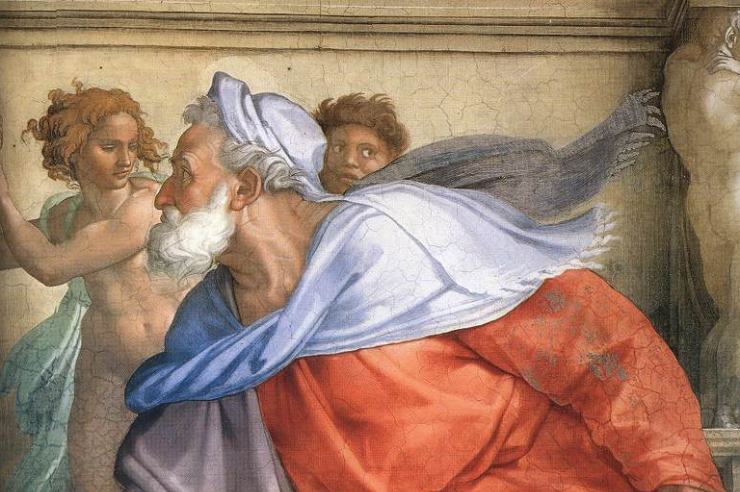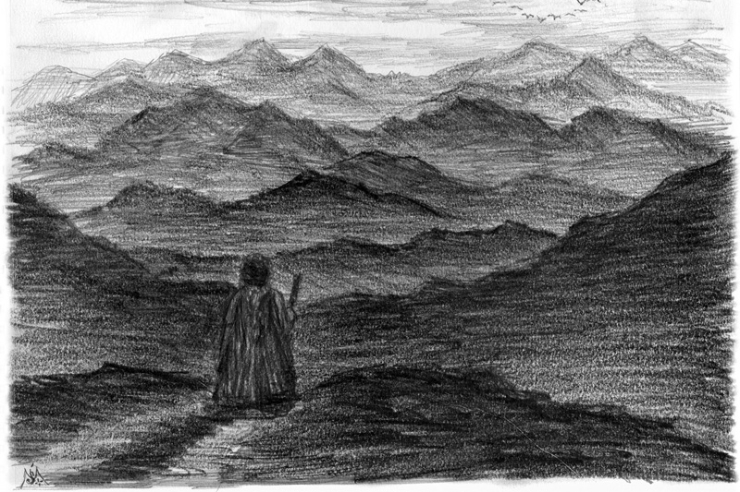
“Ezekiel” (detail) by Michelangelo [Public domain], via Wikimedia Commons
“Our duty is to share the Lord. It is the responsibility of the Holy Spirit to convert souls. We mustn’t show frustration or anger when people do not respond as we expect them to. We must simply remain faithful and love them.”
Jesus said, “Blessed are you when men revile you and persecute you and utter all kinds of evil against you falsely on my account. Rejoice and be glad, for your reward is great in heaven, for so men persecuted the prophets who were before you” (Matthew 5:11-12).
The life of God’s prophet is never dull; it’s often perilous. The rejection, persecution, and ridicule of the prophet is the order of the day, both in distant history and in our own time.
In the Gospel for today’s Mass (Mark 6:1-6), Saint Mark recounts the rejection of Jesus by the townspeople in his hometown of Nazareth. Jesus knows, by experience, the rejection of what he speaks.
Each of today’s readings concern the prophets of God, so let’s spend some time getting to know about them and their relevance to us today.
So What and Who Are the Prophets?
A prophet is simply someone God has sent to deliver a message on God’s behalf.
Most Christians, when asked about the prophets, think about the prophets of the Old Testament. I believe that most of us have heard of Isaiah, Jeremiah, Ezekiel and Daniel. The Church refers to these as the Major Prophets, because of the length of their writings. Our first reading today was from the prophet Ezekiel. There are twelve other prophets we refer to as Minor Prophets. These prophets are called minor because the length of their written work is significantly shorter than that of the major prophets. These would include such famous prophets as Hosea, Jonah, Micah, and Malachi.
But, there are many other Old Testament prophets who do not have books named after them. We sometimes refer to these as the Former Prophets. These would include great figures from history such as Abraham, Deborah, Elijah, Elisha, Nathan, and many others. Indeed, the greatest prophet of the Old Testament was Moses because he is said to have talked with God face-to-face and not by way of a vision.
When God needs to get a message to us, He sends a prophet.
Are Prophets Welcomed?
The message God sends by way of His prophet is usually uncomfortable and not at all what we want to hear. We see this throughout the Old Testament. God’s people would turn from His ways and toward sin. Sin has a terrible cost and so His people would experience terrible consequences.
So, God would send a prophet who would tell them—make them aware—of their sin. The prophet would often foretell or warn of future punishments or consequences if they did not repent and turn back to God. Most of God’s prophets were rejected, many of them killed.
Ezekiel is a very interesting example of a prophet. In today’s first reading (Ezekiel 2:2-5), God sets Ezekiel upon his feet, fills him with His Holy Spirit and gives him His message to deliver. There will be no doubt that Ezekiel is a prophet. This takes place alongside the Chebar River where Ezekiel lived among the other exiles from Israel during the Babylonian Exile.
Ezekiel prophesied the fall of Jerusalem and the destruction of Solomon’s temple in advance as a consequence of Israel’s sin. Although they were already taken into Babylon as captives, the people did not want to hear it. God delivered very uncomfortable news through Ezekiel. Judgment and loss were visited upon the House of Israel as a consequence of their sin.
But, I encourage you to read all of the Book of Ezekiel because there is usually the potential of good news to follow the bad. In later years, Ezekiel prophesied the restoration of Israel. One of the great passages of the Old Testament is the vision of the Valley of Dry Bones found in Ezekiel 37. Ezekiel foretells of God’s consolation and restoration of the House of Israel as He breathes new life into their dry bones.
A New Prophet Like Moses
In Deuteronomy 18, Moses prophesies of a time to come when God would raise up a new prophet who would be like Moses.
Now think about all the great prophets sent by God after the time of Moses. As important as each was, none was like Moses. At the time of Jesus, the people of Israel and Judah had been waiting for over a Millenia for this great prophet to come.
God had a surprise for His people. This great prophet had come as a small babe born in a stable in Bethlehem. He had sent His own son. This great prophet would not only speak on behalf of God, He would be God the Son, speaking for God, the Father.
In the Gospel we see that, like the prophets before Him, Jesus was rejected by the people. We see this among his kinsmen and fellow townspeople in Nazareth. They lacked faith. And this foreshadowed the broader rejection of Jesus by most of the House of Israel and their leaders. They would throw Him out of Jerusalem and kill Him on the Cross. Jesus suffered the rejection so many before Him had experienced.
Prophetic Voices in Our Time
But, what has all this to do with me today?
God still speaks to us through His Son and through those His Son sends by the power of the Holy Spirit. Through His Church and His saints.
We must not make the mistake of those who came before us who rejected God’s message and His prophet. Jesus observed the lack of faith of the people of Nazareth. We must exercise our faith. Faith is both a gift from God and an exercise of our will. We must choose to receive God’s message, embrace it and live it if we want to experience life to the full and the Beatitude of God.
When we were baptized, we entered into the three-fold office of priest-prophet-king. Each of us is called by God through our baptism to be His witness in this world, carrying His message of Good News to those He places in our life.
God sets us on our feet and fills us with His Spirit and gives us His Word. We are to share the Lord with others—without fear or anxiety, with confidence and always with love and kindness. If we feel lacking, remember the Vision of the Valley of the Dry Bones and ask God to breathe life into you.
Our duty is to share the Lord. It is the responsibility of the Holy Spirit to convert souls. We mustn’t show frustration or anger when people do not respond as we expect them to. We must simply remain faithful and love them. Pray God that we will always be faithful, and then, whether we are received or rejected, we are Blessed.
Into the deep…
The scripture readings during Holy Mass for the Fourteenth Sunday in Ordinary Tine (Year B) are Ezekiel 2:2-5; Psalms 123:1-2, 2, 3-4; Second Corinthians 12:7-10; Mark 6:1-6.
Deacon Bickerstaff is available to speak at your parish or event. Be sure to check out his Speaker Page to learn more. Into the Deep is a regular feature of the The Integrated Catholic Life™.
Please share this article on Facebook and other social media below.

Please help us continue our mission!
We welcome both one-time and monthly donations. A monthly subscriber giving just $10 a month will help cover the cost of operating Integrated Catholic Life for one day! Please help us bring enriching and inspiring Catholic content to readers around the world by giving today.
Thank you and may God Bless you for supporting the work of Integrated Catholic Life! Integrated Catholic Life Inc is a nonprofit public charity under Internal Revenue Code Section 501(c)(3). These contributions are tax-deductible as provided under U.S. tax laws.












